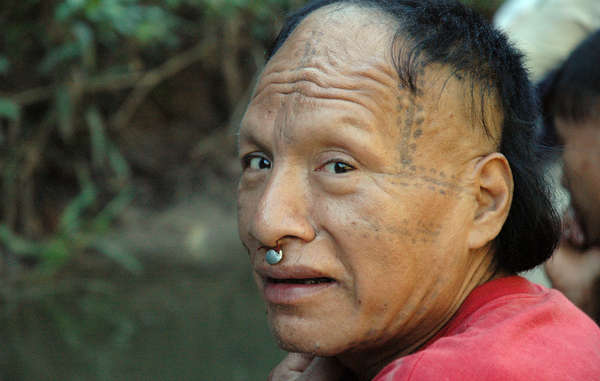
by Deep Green Resistance News Service | Jan 29, 2018 | Colonialism & Conquest
Featured image: Tomas was contacted between 2001 to 2003 and now lives in the Amazon region where one of the deadliest roads has been proposed. © David Hill/Survival International
by Survival International
Peru has approved a law that could devastate several uncontacted Amazon tribes.
The law declares “in the national interest” the construction of roads in the remote Ucayali region that borders Peru and Brazil.
The area lies inside the Uncontacted Frontier, home of the highest concentration of uncontacted tribes on Earth.
Several illegal roads that cut through uncontacted Indians’ lands have already been opened up. Thousands of illegal gold miners operate in the region, and have polluted dozens of rivers with mercury.
Uncontacted tribes face catastrophe unless their land is protected. They have the right to their land under Peruvian and international law.
Road building in the Amazon almost always leads to a devastating influx of settlers, loggers and ranchers.
Pope Francis, speaking from the region just days before the road law was passed, said: “Never before has there been a greater threat to indigenous peoples’ lands.
“We must break with the historical paradigm that sees the Amazon as an inexhaustible resource for other countries, without taking into account its inhabitants.”
Survival is calling on the Peruvian government to scrap road building plans inside the Uncontacted Frontier.
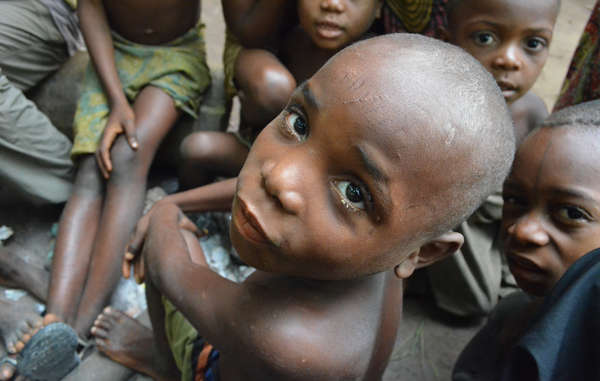
by Deep Green Resistance News Service | Jan 8, 2018 | Colonialism & Conquest
Featured image: A recent epidemic in the Republic of Congo is said to have been aggravated by the loss of indigenous peoples’ resources due to conservation and logging projects. © C. Fornellino Romero/Survival International
by Survival International
A Congolese organization has recently raised concerns that conservation contributed to the deaths of several dozen children, mostly Bayaka “Pygmies,” during an epidemic in 2016 in the Republic of Congo – the latest in a long line of related reports.
The deaths have been attributed by a medical expert to malaria, pneumonia and dysentery, aggravated by severe malnutrition.
Conservation-related malnutrition among Bayaka children in this region has been reported since 2005 at least, as the Bayaka are prevented from hunting and gathering on their lands by wildlife guards through violence and intimidation.
These guards are funded and equipped by the Wildlife Conservation Society (WCS), one of the world’s largest conservation organizations, and the logging company it has partnered with, CIB. Both organizations have failed to take effective action to prevent abuse.
“The wildlife guards abuse us. They don’t want us to go into the forest. How can we feed our children?” a Bayaka man from Mbandza, the site of the epidemic, told Survival in 2016.
These guards have been accused of abusing Bayaka and stealing their food for over 13 years. One such attack that took place in Mbandza in early 2016 left one man hospitalized.
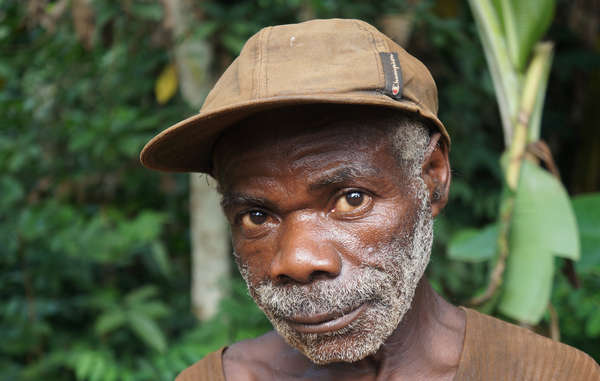
The Baka and Bayaka’s consent is required by law for any major project on their lands, but this is ignored by WWF and WCS. © Survival International
In this way, the Bayaka are being illegally evicted from their ancestral homelands by threat of violence. As one Bayaka woman explained: “If we go into the forest we eat well there compared to the village. We eat wild yams and honey. We want to go into the forest but they forbid us to. It frightens us. It frightens us.”
Critics have noted that the guards have also failed to protect the wildlife the Bayaka depend on for food, since they have difficulty tackling corruption and the creation of logging roads, the two main drivers of poaching.
Plummeting health has been reported among Bayaka living in the Dzanga-Sangha Protected Areas in the Central African Republic – one of the World Wildlife Fund’s (WWF) flagship projects – since 2006. Conditions encountered among older women “would be considered a public health crisis by international health agencies,” according to research published in 2016.
Increased malnutrition and mortality have been reported among Baka “Pygmies” in Cameroon, where WWF also operates, and among Batwa “Pygmies” in another of WCS’s project sites in east Democratic Republic of Congo.
“Now we are afraid of the anti-poaching squads. Before when a woman gave birth we took her to the forest to help her regain her strength and weight, now we can’t do this. We would take our children to the forest to avoid epidemics. Now we know illnesses we never knew before,” one Baka woman in Cameroon told Survival.
Watch Baka describe the abuse they face as a result of WWF’s conservation projects
Baka health plummets due to conservation
In the Congo Basin, the Baka, Bayaka and dozens of other rainforest peoples are being illegally evicted from their ancestral homelands in the name of conservation. Their health is plummeting as a result.
The big conservation organizations that support these conservation projects, like the World Wildlife Fund (WWF), refuse to abide by basic international standards and secure their consent.
Neither WCS nor WWF has attempted to secure the indigenous peoples’ consent, as basic due diligence and their own human rights policies require.
Survival’s Director Stephen Corry said: “Land theft is a serious and deadly crime, as these reports show. Many associate conservation with reason and compassion but, for Baka and Bayaka, it often means mindless violence and plummeting health. When will WWF and WCS finally start complying with their own human rights policies? ”
Timeline
1996: The organization Berggorilla & Regenwald Direkthilfe finds that malnutrition and mortality has increased among Batwa “Pygmies” since they were evicted from Kahuzi-Biega, a national park in east Democratic Republic of Congo (DRC) funded by WCS.
1997: WWF observes that the fact that the Bayaka are banned from hunting or gathering inside the Dzanga-Ndoki Park, the park in the Central African Republic (CAR) that WWF helped to create, “punishes [the Bayaka] severely” and is undermining their food security.
2000: A study finds that the Batwa in Kahuzi-Biega, DRC, are suffering from nutritional deficiencies, because they are no longer able to hunt in the forest, and soaring mortality rates. Malnutrition is particularly pronounced among women and children.
2004: A BBC investigation into CIB’s logging concessions in Congo hears from a Bayaka man: “We get so much suffering because of [wildlife] guards. We can’t go and find things in the forest as we used to. All we hear is hunger.”
2004: Bayaka from another community in Congo report to Greenpeace: “Then we met another white man (WCS) who came to tell us to stop hunting and that the wildlife guards would make sure we did. Now we are afraid to go far in the forest in case the wildlife guards catch us so we have to stay in the village. […] Now we are dying of hunger.”
2005: The Congolese Observatory on Human Rights, the organization that reported on the 2016 epidemic, documents three cases of violent abuse against Bayaka by wildlife guards, and warns that some Bayaka “are dying of hunger.”
2005: A news report recounts how Bayaka in one of CIB’s logging concessions describe being targeted by wildlife guards that mistreat and temporarily imprison them, and how this has led to more frequent malnutrition among children and vulnerable adults.
2006: WWF and its partners commission a report that finds that the Bayaka in Dzanga-Sangha, CAR, are struggling to feed themselves. The Bayaka interviewed for the report state that the conservation project has forced them out of some of their richest hunting and gathering grounds. They report that wildlife guards harass or attack them even when they try to use the reduced areas of land they have left, all the while accepting bribes from the real poachers who were emptying the forest of its wildlife. Some Bayaka women are finding it so hard to find food, the investigator hears, that they have been driven to sex work in the nearby town.
2006: An article in The Lancet cautions that “Pygmy peoples’ health risks are changing as the central African forests, which are the basis for their traditional social structure, culture, and hunter-gatherer economy, are being destroyed or expropriated by […] conservation projects:”
2008: UNICEF warns that the Bayaka’s right to gather resources is being “flouted on the most basic level because indigenous people no longer have access to areas rich in game” due to protected areas in Congo.
2012: An anthropologist with 18 years’ experience working with Bayaka in Congo reports increasingly poor nutrition and increased mortality. He attributes this to the removal of forest resources by loggers and to “conservationists’ exclusionary and draconian management practices.”
2013: A researcher at the University of Oxford reports that the combined impact of conservation and logging have led to poorer health and higher levels of drug and alcohol addiction among the Bayaka. He argues that conservation efforts would benefit from gaining people’s consent
2014: A medical study finds that “punitive anti-poaching measures” and dwindling wildlife have caused health to plummet among Bayaka in Dzanga-Sangha, CAR, particularly among women. “It is disheartening to see health decline so closely tied […] to the conservation management policies of the last twenty-five years,” the study’s authors note.
2015: A doctor with extensive experience working in CIB’s logging concessions reports that: “Aside from wounds inflicted by gorillas, buffalo or other wild animals, my colleague and I also see [gun] wounds in people claiming to have been attacked – sometimes without warning – by the protectors of wildlife: the wildlife guards.”
2015: The same doctor tells Survival: “I find this [wildlife guard violence] a very serious problem and in my opinion most wildlife guards have other motives than protecting the animals to work as a wildlife guard.”
2016: A second doctor with extensive experience working in CIB’s logging concessions describes to Survival the seasonal malnutrition she encounters among Bayaka, which she attributes to repressive conservation policies.
“Pygmy” is an umbrella term commonly used to refer to the hunter-gatherer peoples of the Congo Basin and elsewhere in Central Africa. The word is considered pejorative and avoided by some tribespeople, but used by others as a convenient and easily recognized way of describing themselves.
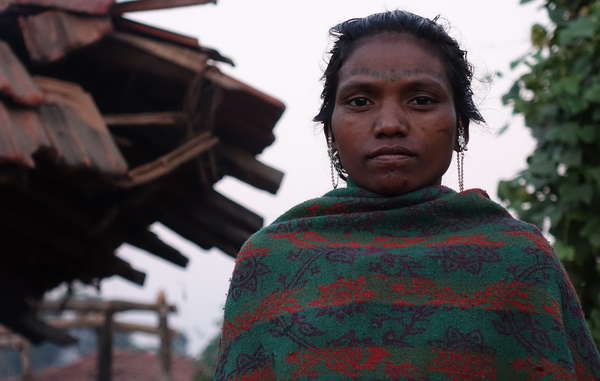
by Deep Green Resistance News Service | Jan 4, 2018 | Colonialism & Conquest
Featured image: This Baiga woman was evicted from Kanha tiger reserve. © Survival International
by Survival International
India’s National Tiger Conservation Authority (NTCA) is coming under increasing pressure over its illegal order banning the recognition of tribal forest rights in tiger reserves. The order prompted Survival International to launch a global tourism boycott in November.
Information released to Survival has revealed that India’s tribal peoples’ Commission (officially called the National Commission for Scheduled Tribes (NCST)) has directly challenged the NTCA’s order in private meetings in Delhi. The Commission demanded that the NTCA suspend any planned evictions of tribal peoples, who have been dependent on and managed their forests for millennia.
After demanding to meet with the NTCA, the Commission argued that the order violates India’s Forest Rights Act – which guarantees tribal peoples’ rights to their forests. It was intended to address the “historical injustice” against tribes and other “traditional forest dwellers.”
In November, representatives of tribal communities met with many human rights and environment activists in Delhi, amidst mounting concern over the NTCA order.
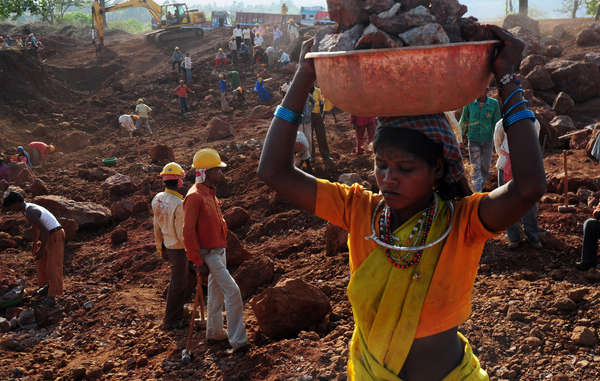
A Baiga woman works for daily wages on Vedanta’s Bodai-Daldali bauxite mine, Chhattisgarh © Sayantan Bera/Survival
J.K. Thimma, a Jenu Keruba man who lives in Nagarhole National Park, and was present at the meeting, said: “The NTCA order is an attack against our culture and our tradition. This is anti-Constitutional and the NTCA have no right to stop the implementation of an Act passed by the Parliament… This is denial for our existence. The order needs to be withdrawn as soon as possible, it is creating fear among all of us.”
Another tribal man, Shankar Barde from Tadoba Tiger Reserve, said: “After years of restrictions and hardships, finally we were told early this year by the district administration that our rights have been recognized. We were excited… but then we were told by the district administration that NTCA order does not allow our rights to be recognized. This is a complete injustice. Dozens of outsiders are earning large sums of money in our backyard while we struggle to even live with dignity.”
Indian law specifically states that the NTCA does not have the power to “interfere with or affect the rights of local people, particularly… tribes.” Tribal rights are under the jurisdiction of the Ministry of Tribal Affairs.
Despite this, conservation authorities have violated the rights of tribal peoples. Across India, tribal peoples endure harassment, coercion, and illegal eviction from their ancestral homelands in the name of conservation.
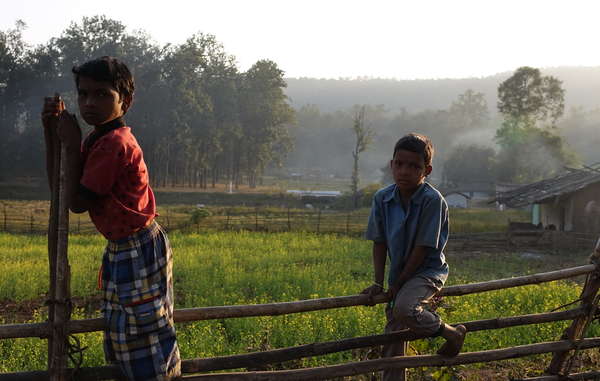
Baiga children. Their village was notified with eviction. Achanakmar Tiger Reserve. © Survival
After eviction, tribal people face lives of poverty and exclusion on the fringes of Indian society. Meanwhile, huge numbers of tourists are then invited into tiger reserves, disrupting tiger habitats and making tigers more vulnerable to poaching.
Survival International is leading the global fight against injustice and abuse in the name of protecting wildlife.
Survival’s Director Stephen Corry said: “This order is an attack on India’s tribal peoples – it’s also illegal. Polluting and destructive industries such as uranium mining and tourism are apparently welcome in tiger reserves, but conservationists in India remain determined to kick tribal people off their land. It’s time they partnered with the best conservationists and guardians of the natural world, and stopped persecuting them. Tribal peoples know their land and its animals better than the conservationists.”
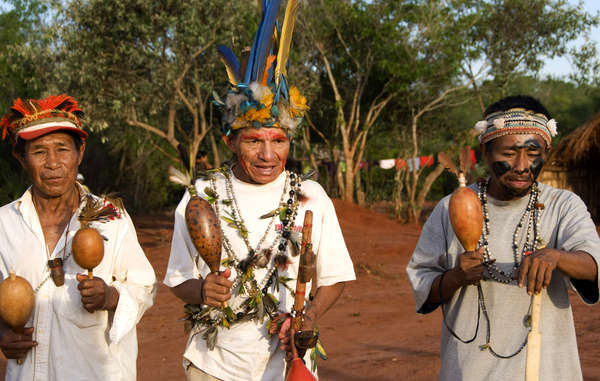
by Deep Green Resistance News Service | Dec 26, 2017 | Colonialism & Conquest
Featured image: The Guarani continue fighting for their land rights despite continuous attacks. © Fiona Watson/Survival International
by Survival International
Ten years ago the Brazilian government signed a landmark agreement with the Guarani tribe, which obliged it to identify all their ancestral lands.
The core objective of the agreement, which was drawn up by the public prosecutors office, was to speed up the recognition of the Guarani’s land rights in the southern state of Mato Grosso do Sul.
However, one decade on, most surveys have not even been carried out and the authorities’ failure to recognize the Guarani’s land rights continues to have a terrible impact on the tribe’s health and well-being.
With no immediate hope of recovering their land and rebuilding their livelihoods, thousands of Guarani are trapped in overcrowded reservations where the prosecutors say there is so little land that “social economic and cultural life is impossible.”
Other Guarani communities live along busy highways or on fragments of their ancestral land, hemmed in by vast sugar cane and soya plantations. They cannot plant, fish or hunt and have no access to clean water.
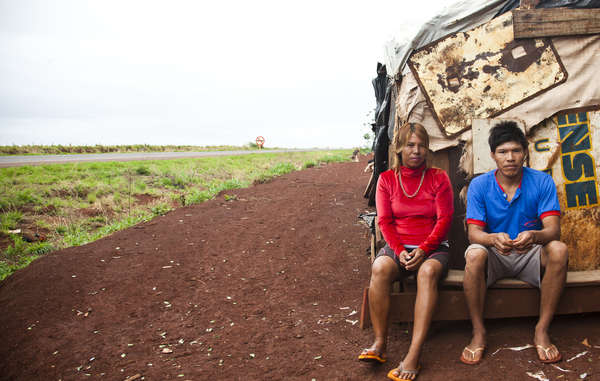
A Guarani-Kaiowa couple sit outside their makeshift roadside settlement of the Apy Ka’y community, near Dourados, Mato Grosso do Sul, Brazil. © Paul Patrick Borhaug/Survival
Health workers report that these communities are suffering from severe side effects of pesticides used by agribusiness. Some communities say their water resources and houses are deliberately sprayed by the ranchers.
A recent study estimated that 3% of the indigenous population in the state could be poisoned by pesticides, some of which are banned in the EU.
Malnutrition especially among babies and young children is common. According to Gilmar Guarani: “Children cry and cannot put up with this situation any more. They are really suffering and are very weak. They are practically eating earth. It’s desperate.”
Mato Grosso do Sul is home to the second largest indigenous population in Brazil, with 70,000 Indians belonging to seven tribes.
Much of their ancestral land has been stolen from them by cattle ranchers and agribusiness, and now they occupy a mere 0.2 % of the state.
John Nara Gomes says: “Today the life of a cow is worth more than that of an indigenous child… The cows are well fed and the children are starving. Before we were free to hunt, fish and gather fruits. Today we are shot by gunmen.”
The despair among the Guarani at the loss of their lands and self sufficient life is reflected in extremely high rates of suicide . In the period 2000-2015 there were 752 suicides. Statistics collected since 1996 reveal a rate that is 21 times greater than the national one. This is probably under-estimated as many suicides are not reported.
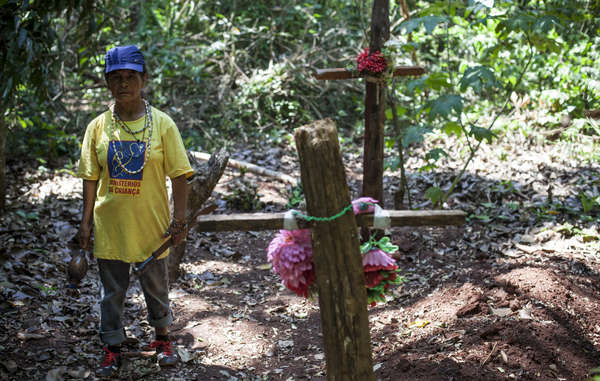
Damiana Cavanha, leader of the Apy Ka’y community, has seen the deaths of three of her children and her husband. She is determinedly planning a reoccupation of their ancestral land where they are buried. © Paul Patrick Borhaug/Survival
The Guarani also face high levels of violence and are constantly targeted by ranchers’ gunmen whenever they attempt to take back parts of their ancestral land. Recent data shows that 60% of all the assassinations of indigenous people in Brazil occurred in Mato Grosso do Sul state.
With a government and congress dominated by the powerful agribusiness sector, the landowners in Mato Grosso do Sul will not cede an inch. Many have resorted to the courts as a delaying tactic, to challenge the identification of Guarani territories. One core Guarani territory has had 57 legal challenges.
Despite this bleak scenario many Guarani vow to fight on: “Brazil was always our land. The hope that feeds me is that our land will be recognized, for without it we cannot care for nature and feed ourselves. We shall fight and die for it” says Geniana Barbosa, a young Guarani woman.
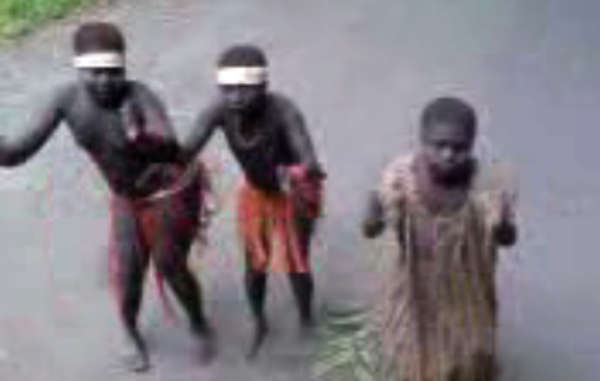
by Deep Green Resistance News Service | Oct 17, 2017 | Colonialism & Conquest
Featured image: Still from video showing Jarawa girls forced to dance for tourists along the illegal Andaman Trunk Road. © Anon
by Survival International
Tour operators in India’s Andaman Islands are selling “human safaris” to the reserve of a recently-contacted tribe, despite government promises to ban the practice.
Tourists travel along a road through the Jarawa’s forest, treating tribespeople like animals in a safari park. In 2013, the Andaman government promised to open a sea route to the Islands’ most popular tourist destinations, which would stop tourists needing to drive through the Jarawa’s reserve. The sea route has recently become operational.
But despite the authorities’ commitment to ensuring all tourists would have to use the sea route, very few currently do, and the market in human safaris along the road is flourishing.
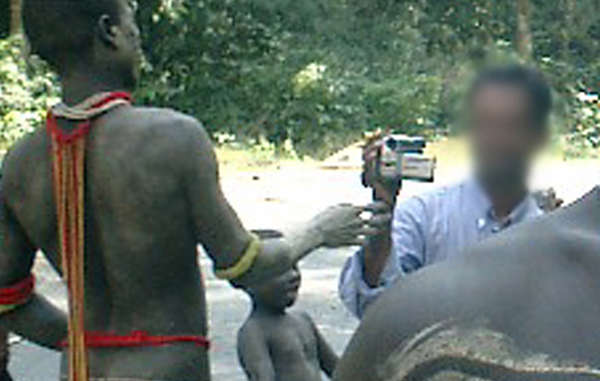
A tourist films a Jarawa man up close on the road. Campaigners have raised deep concerns about the dangerous, degrading and exploitative nature of tribal tourism. © Survival
One tour company, Tropical Andamans, states that: “The Famous Jarawa creek is a lonely planet in itself. It is the dwelling place of the oldest tribes found in these islands. The tribes known as Jarawas, are aloof from the civilized world. They are the wonder of the modern world, for they feed on raw pigs, fruits, and vegetables. They don’t speak any language known to general public. Their pitch black skin and red eyes will leave you dazzled in case you happen to meet them.”
A tourist website, Flywidus, offers a glimpse of “primitive tribals” to tourists driving through the Jarawa reserve, and another, Holidify, describe the Jarawa as a “major attraction” and claims that the Jarawa “love the high of specific drugs, one of it being tobacco.”
In 2002 India’s Supreme Court ordered the road closed, but it has remained open continuously despite pressure from human rights campaigners.
Survival International led a global campaign against the human safaris, calling for a boycott of the Andaman tourist industry until they came to an end. Nearly 17,000 people from around the world pledged not to holiday in the islands in protest.
In a recent statement, the Andaman government said that the road: “…shall remain open for the use of both islanders and the tourists as no decision has been taken by this Administration for closing it down for the tourists. However, the tourists have been advised to avail boat service.”
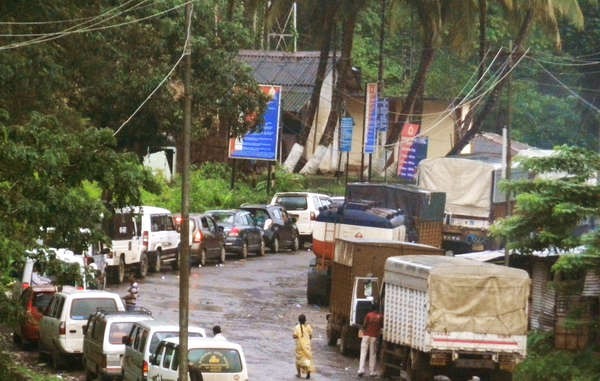
Tourist vehicles queuing to enter the Jarawa tribal reserve. © www.andamanchronicle.net /Survival
Background briefing
– The road brings a daily invasion of hundreds of tourists into the heart of the Jarawa reserve. The promotion by tour operators of sightings of the Jarawa is illegal in the islands, but this is not being enforced.
– The UN, India’s Minister for Tribal Affairs and members of the European Parliament have all condemned the practice.
– One tourist described his trip: “The journey through tribal reserve was like a safari ride as we were going amidst dense tropical rainforest and looking for wild animals, Jarawa tribals to be specific.”
– The Jarawa, like all recently contacted peoples, face catastrophe unless their land is protected.
– The human safaris are also dangerous – one Jarawa boy lost his arm after tourists threw food at him from a moving vehicle. They sparked global outcry in 2012 after footage emerged of a tourist forcing several Jarawa girls to dance.
– Tribal peoples’ land rights have been part of international law for generations. The key to their survival and prosperity is to ensure their land remains under their control.
– All uncontacted and recently contacted tribal peoples face catastrophe unless their land is protected. Survival International is leading the global fight to secure their land for them, and to give them the chance to determine their own futures.
Survival’s Director Stephen Corry said: “The new sea ferry was supposed to stop tour buses driving through Jarawa land, and so put an end to these dangerous and disgusting human safaris. But the government wants it to be optional which defeats the purpose entirely. Tourist companies are still selling the safaris and profiting from the exploitation of tribal people. Ethical tourists should boycott the islands until this is stopped.”












